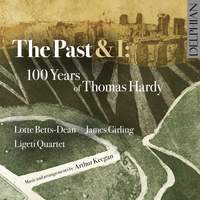Recording of the Week,
The Past & I: 100 Years of Thomas Hardy
The results are even more mesmerising and moving than I’d hoped for, and the up-and-coming composer at the heart of it all has jumped straight to the top of my One To Watch list. Released on Delphian today, The Past & I began life at Britten’s former home The Red House, where Arthur Keegan (b. 1986) enjoyed a residency in 2019; the fruits of his time in Aldeburgh include two substantial works in the form of elegies for Hardy and for his first wife Emma, plus new arrangements of Hardy settings by composers including Gerald Finzi, Imogen Holst, Ivor Gurney and Britten himself.
The title of the album is taken from a line in Hardy’s poem ‘The Ghost of the Past’, and the themes of nostalgia, bereavement, haunting and awareness of one’s own mortality loom large not just in the texts but in Keegan’s imaginative approach to setting or colouring them. And if you dig a little deeper, there’s another layer of meaning at work: throughout the programme we get a vivid picture of a young composer figuring out his own relationship with his forebears, as Keegan responds not only to Finzi, Gurney et al but also to the much earlier English lute-song tradition and the uncanny atmosphere of The Red House itself.
The first work on the programme is Elegies for Emma, a song-cycle for mezzo and guitar setting the remorse-laden poems which Hardy wrote shortly after her death, and it’s eerily beautiful stuff. Betts-Dean’s voice initially emerges seamlessly from the guitar resonance hanging in the air, as if we’re tuning into a presence that’s been there all along, and what follows is essentially a miniature opera as she, Keegan and guitarist James Girling breathe life into Emma herself as well as into Hardy’s memories of her.
The spoken setting of ‘I look into my glass’ (clearly delivered from Emma’s perspective rather than that of her husband) is particularly striking, as is the sense of anger at the male gaze in ‘She to Him’ and the use of folksong from Emma’s native Cornwall in ‘Days to Recollect’. Here, as elsewhere, Keegan is supremely attuned not only to the finer details of Hardy’s poetry but also to his peculiar blend of old-school pastoral and what he once termed ‘the ache of modernism’ as those snatches of folk-music are disrupted by unexpected harmonies and extended vocal techniques. Betts-Dean is utterly compelling throughout, with immaculate diction and a full palette of colours available across her wide range.

Before the Elegies for Tom (essentially a string quartet interspersed with fragments from Philip Larkin’s 'The Mower') which balances out the opening work, we have a beguiling sequence of Hardy settings by earlier composers, given new life and texture by Keegan’s arrangements which replace the piano with string quartet, guitar or both. The effect is akin to seeing those colourised versions of old black-and-white photographs, and the results would be worth the price of the album alone.
Stand-outs include a little triptych of settings by Imogen Holst, Ivor Gurney and Robin Milford reimagined as lute-songs in the spirit of Britten’s Dowland homages, and a trilogy of songs about railways by Derek Holman, Muriel Herbert and Britten. Holman’s depiction of the ‘journeying boy’ in ‘Midnight on the Great Western’ (already more laid-back than Britten’s nervy setting in Winter Words) takes on an almost louche elegance when upholstered with guitar and strings, whilst Britten’s own depiction of the convict and child busker in ‘At the Railway Station, Upway’ gains much from the presence of plucked strings (Keegan opts for a guitar rather than taking the text literally and going for a violin here, and it works).
Die-hard Hardy fans will doubtless relish rediscovering these texts through Keegan’s perspectives, but I’ll wager that this album will spark a fair few new love-affairs with his poetry as well…
Lotte Betts-Dean (mezzo), James Girling (guitar), Ligeti Quartet
Available Formats: CD, MP3, FLAC/ALAC/WAV, Hi-Res FLAC/ALAC/WAV




